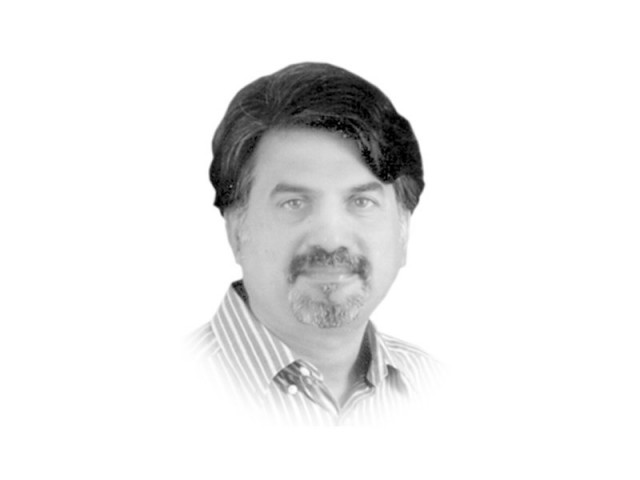Crackdown on extremism
Can we attribute the reasons for our lack of progress as our inability in cementing institutions?

The writer is a member faculty of contemporary studies at NDU Islamabad and can be reached at muhammadaliehsan1@hotmail.com
In the post-Pulwama environment in which the country is riding a high political and diplomatic tide, this action like many others so far should add to the standing and credibility of the Imran Khan-led government. We may defend the existence and continuity of madrassas as ‘education departing setups’ but we cannot for sure certify and guarantee that the education being imparted in some of them is not acting as an enabler for radicalising and motivating young minds to opt for a life of militancy.
While the end which is the prevention and spread of terrorism is important, the means also matter. Pakistan cannot afford a ‘cosmetic preventive strategy’. This kind of strategy has its origin in the great tussle of power that this country was forced to witness in the ‘re-birth of democracy decade’. Francis Fukuyama, in his masterpiece Political order and political decay, refers to three essential institutions: state, rule of law and a government that is accountable. Can we attribute the reasons for our lack of progress as our inability to cementing these institutions?
Surely, decay in Pakistani politics has been a result of the weakening of these institutions and some of the most essential work like the removal of extremism and radicalism from society suffered as a result of this political decay. The military has been at the center of power in Pakistan for a long time and firstly, it was the responsibility of the democratic government to gradually take the center stage and not to formulate strategies to ‘sideline and elbow military out’ but to sit with it and formulate, drive and execute national security strategies. ‘Lending its ears’ to the ‘Pulwama accusers’ and also deciding to ‘privately host its leadership’ for a visit to Lahore was never a state strengthening political move. Secondly, the rule of law was supposed to act as a limit on the power that the democracies enjoyed — but was law ever allowed to rule? Unlimited political power forced our democratic leadership to bask in the ‘unrestrained democratic glory’ and thus it followed the course of the famous dictum ‘absolute power corrupts absolutely’. Thirdly, democratic accountability which was never allowed ‘bankrupted the moral standing’ of the semblance of any democracy we had and thus prevented the development of the suitable environment to take concrete and absolute action against the banned organisations and the spread of their network of organisations in the country.
What was required was a sound implementation strategy that in the post-APS Peshawar tragedy could take over or close all outfits that promoted the spread of extremism and radicalism but also alternatively ensured the continuity of jobs and education of many beneficiaries of those institutions. This was not an easy task and required the PML -N government’s deep-set political resolve and resolution and something that needed its complete attention and due priority. The military component of NAP flourished and succeeded whereas the political component remained nested and never took a flight. Engaged in an undue competition of some sort with a strong national institution, the PML -N government lost its democratic focus and relied more on taking the credit (ownership of the means) rather than strategising and deciding an end. Such an end was never decided and the whole process of strategising made controversial with the ‘Dawn leaks’ trumpeting a public confusion that forced them to ask a question — Is there a reluctant hand that holds the hammer yet doesn’t want the problem to be nailed? In the post-NAP setting, the five years wasted have their roots in democratic decay and failure. If it was not so — both the civil and military chapters of the state would not have acted like the way they have today. There is no doubt that there is this trinity of homogeneity in purpose, policy, and implementation and all national institutions are resolutely on board to serve it.
This struggle against the removal of radicalism and extremism from the society will be a long-fought battle and will be more about winning the hearts and minds. The political opposition in the country will also have to forego their usual method of ‘point-scoring’, an indication of which is the demand by the PPP chairman that if the government is serious ‘it should remove those cabinet ministers who support these organisations’. All the political parties will have to come on board to implement this ‘extremism and radicalisation prevention programme’ because the root of its delay in implementation is a result of long years of failed politics.
If some of these organisations were favoured and defined as assets in the past, it was only in an environment that necessitated the promotion of such a definition. Fighting alongside the Americans against the Soviet invasion in Afghanistan, this definition was even acceptable to the Americans.
The challenge posed by extremism and radicalism will require our huge efforts to overcome it. The international community would do well to understand the challenge we face and support us to overcome it.
Published in The Express Tribune, March 10th, 2019.
Like Opinion & Editorial on Facebook, follow @ETOpEd on Twitter to receive all updates on all our daily pieces.















COMMENTS
Comments are moderated and generally will be posted if they are on-topic and not abusive.
For more information, please see our Comments FAQ